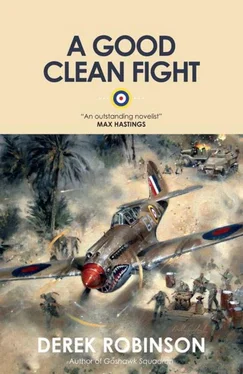At first some people refused to believe the report. Fort Lamy bombed? Don’t be absurd. Some radio operator’s got himself blotto on the local hooch. Signals bounced back and forth. The raid was confirmed, clarified, expanded, personally witnessed and endorsed by the Fort Lamy station commander. A solitary Heinkel had taken out twenty-three Hurricanes and three months’ fuel supply.
A brash young squadron leader, freshly arrived from England to fetch and carry for an air vice-marshal, couldn’t see what all the fuss was about. “It’s a bit cheeky, I agree, sir,” he said, “but we often lose more than that to the U-boats in a single convoy, so…”
“Don’t be a bloody idiot all your life,” the air vicemarshal growled. They were pounding along a corridor to a suddenly urgent meeting. “The Takoradi Trail’s an artery. In fact it’s the artery, there isn’t another, and we’ve been getting fifty Hurricanes a week pumped up it. Now this cocky Hun stooges across from God knows where and chops the artery! There’s blood all over Chad, and our hopes of air superiority up the blue have gone down the bog! Got it now?”
“Yes sir.” The squadron leader put on a spurt and opened the door to the room inside which sudden urgency was already loud.
The meeting made some fast decisions. Within minutes, signals went top secret, top priority, to the station commanders at Maiduguri, Geneina and El Fasher—stages on the Takoradi Trail to the west or east of Fort Lamy—ordering all aircraft to be dispersed immediately. Ditto fuel supplies.
By now an expert on the Heinkel 111 had been found and the meeting was pretty confident that the raider must have refueled somewhere in the desert. There was much stabbing of index fingers at various spots on the map of North Africa, and a short shock when it was realized that to the north of Nigeria lay the French province of Niger. Unlike Chad, Niger had remained loyal to the Vichy Government in France. Niger was therefore stiff with collaborationists, and if the Luftwaffe had set up a refueling airstrip inside Niger, that would put the field at Kano within easy range. Warning signals went to Kano, in Nigeria. Also to El Obeid and Khartoum, in Sudan. Christ Almighty, if one obsolescent Heinkel could knock out Fort Lamy, nowhere on the Trail was safe.
Meanwhile, somebody had been talking to the Heinkel expert about the bomber’s speed.
“Well,” he said, “given a pair of good engines, properly serviced, and assuming no headwind, I’d say a decent pilot might crank two hundred and fifty miles an hour out of her. But this chap won’t be doing that, of course. He’ll be cruising at the most fuel-efficient speed, which is somewhere in the region of a hundred and eighty miles an hour. Perhaps a hundred and eighty-five as time goes by and his tanks get lighter.”
They returned to the map. Assuming he was flying back to Libya—and that made more sense than going by northern Niger, which was nothing but sand seas and rocks, an enormous distance from anywhere, and therefore not an easy place to stockpile jerricans of petrol—assuming he was trudging home to Libya, where was he now?
South of the Tibesti Mountains, that’s where.
For the first time, the meeting brightened up.
The bugger still had something like seven hundred miles to go. At a hundred and eighty miles an hour. There was time to find him and bust him. It wouldn’t help Fort Lamy, but it might make the Luftwaffe think again.
* * *
The smoke from the burning truck must attract attention. Lampard led Menzies and Smedley down the wadi at a steady jog-trot. They had done this sort of thing in training many times; however, none of them had done it with a smashed jaw. The jolt of each pace caused Menzies mounting waves of pain, pain so great that it swamped his senses. He said nothing, and they were still jogging when he fainted. He fell on his face, and this damaged his injuries even more.
They rolled him onto his back and sat him up. Lampard held his head while Smedley picked bits of dirt out of his mouth. A tooth looked so loose that they thought Menzies might swallow it and choke, so Smedley plucked it out. That provoked quite a lot of blood, and they sloshed some water in his mouth to rinse it out. After all this, Menzies was still unconscious. Lampard hoisted him carefully and carried him over his shoulder. A steady splatter of blood soaked into Lampard’s battledress.
They got out of the wadi and walked fast for a mile. The hillside was thick with boulders. This made good cover but slow going.
It occurred to Lampard that the intelligent thing to have done would have been to shift two of the bodies from Davis’s jeep to his own jeep. Then the Germans might think the whole patrol had been killed.
Too late now.
No shufti-kite. That was encouraging.
Smedley had been watching Menzies’s upside-down face; he said he thought they should give him water. Lampard walked to the next patch of scrub, which was very spindly but it would have to do, and put him down. The limbs were slack, the eyelids were thick and heavy, the head lay where it flopped. Menzies looked dead. Smedley searched hard before he found a pulse.
What amazed Lampard was the amount of blood Menzies had lost. Lampard’s battledress was drenched; it clung to his skin. “That’s because his head’s hanging down,” Smedley said. “We’ve got to keep his head up. I don’t think he’s been breathing right, either.”
Lampard decided to carry him piggyback-fashion. He ripped a long strip from his shirt and tied Menzies’s arms in front, at the wrist. He looped the arms over his head and picked him up by the legs. Smedley shifted Menzies’s head so that it was not on the same side as Lampard’s tattered ear. They walked on.
Smedley was now carrying three weapons and two water bottles. He was a big man; nevertheless there were times when the pace that Lampard set had him gasping. Lampard had a stride like a plowman’s. He saw the obstacles coming and stepped over them. In order to keep Menzies’s head in a safe and steady position he had to lean forward slightly and tilt his shoulders to the side. The flies had been bad before; now they were an army of occupation, claiming their tribute of blood and sweat. Menzies did not notice them. Lampard let them wander where they liked, unless it was into his mouth. Then he spat a small bundle of saliva-coated fly into the dust.
They heard the shufti-kite, once, but it was far behind them. They heard the clatter of half-tracks, once, but it was faint and grew fainter. They met an Arab herding a dozen goats. He pointed to the north and said: “Tedeschi,” which meant Germans. Lampard and Smedley were going south of west, but they thanked him all the same. He looked sadly at Menzies’s shattered face and murmured a Muslim prayer.
Almost twenty-four hours after his patrol had left it, Lampard carried Menzies into the wadi where the base-camp party should have been waiting. It was empty.
Smedley helped him to lift Menzies down and lay him out. Lampard’s hands were locked into the shape of hooks: the fingers refused to relax. But his body felt as if it was floating.
“And here I was, looking forward to a brew-up,” Smedley said. “Just goes to show. You never can tell.” His voice sounded thin and husky; nevertheless it brought one of the fitters running down the wadi. He had been keeping look-out from a nearby cliff top, and had somehow missed their approach. Gibbon and Sandiman, he said, had decided to move base camp to another wadi when this one began to attract too many curious Arabs.
The doctor drove a truck around, treated Menzies where he lay, then drove him back to the new camp. Lampard and Smedley rode in the truck. Corky Gibbon had a brew-up ready for them, “Just the two of you?” he said. He added rum.
Читать дальше












